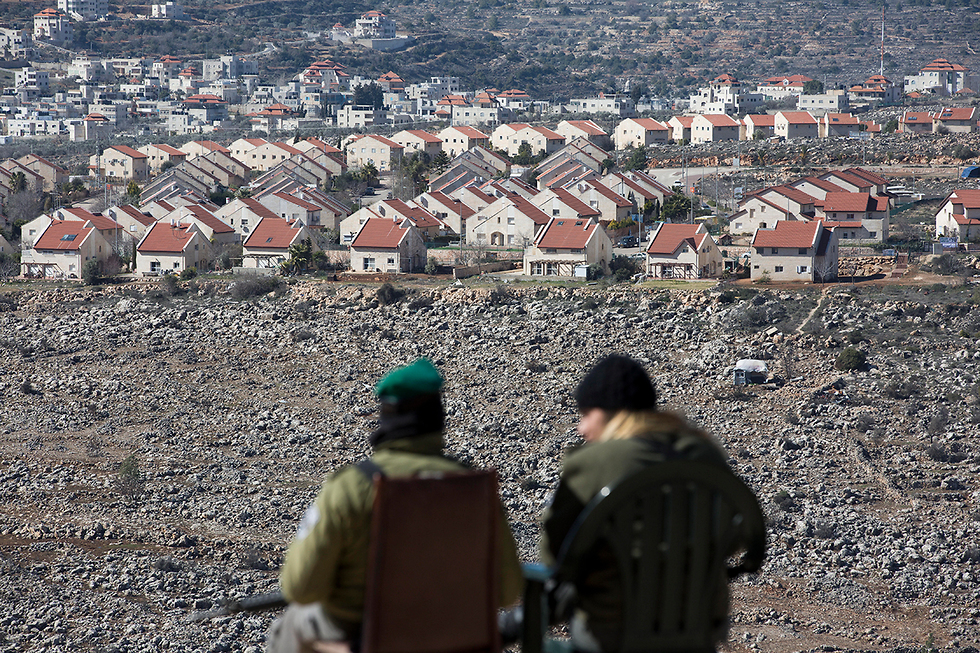Getting your Trinity Audio player ready...
In order to assess just how much Donald Trump's Mideast peace plan will contribute to improving Israel's national and personal security, one must differentiate between two realities: The current one, in which Palestinians boycott the plan, and a hypothetical future one in which they accept the principles of the plan with minor reservations and after negotiations on the details agree to implement it.
In the current climate, Trump's plan changes nothing on the ground. There is nothing to comprise the capabilities of the Israel Defense Forces, Shin Bet security service and Israel Police in the West Bank to gather intelligence, conduct counter-terrorism operations, contain riots or even deal with a full-scale intifada.
5 View gallery


IDF troops operating in the Hebron area of the West Bank
(Photo: IDF Spokesperson's Unit)
This is also true of the security forces' ability to halt the smuggling of weapons, funds and terrorists through the Jordan Valley and the Dead Sea area into Palestinian territories.
If the Jordanian regime suddenly fell or if there were a sudden new threat east of the Jordan Valley and the Jordan River, that threat would be met by a land barrier that would help the IDF block any peril.
Intelligence gathering facilities in the West Bank will continue to operate as they have before, and even on the Gaza border and in the Gaza Strip itself, nothing will change from a military and defensive perspective.
Nonetheless, it is fair to say that the sense of security felt by the 400,000 Jewish residents of the West Bank will improve if their settlements are annexed to Israel, as such a move would lessen the danger of displacement under any future government in Jerusalem or Washington.
But one must also take into account the fact that both annexing the settlements and the lack of a political horizon will have an impact on the Palestinians and bolster the motivation of the young and terror operatives to oppose and undermine the Trump plan.
As such, there is an immediate possibility of violent escalation in the Palestinian territories, which poses a threat to the Jewish communities in the West Bank and along the Gaza border.
As long as there is no Palestinian partner to implement the Trump plan, the security situation – and the potential for short-term escalation - in the West Bank and along the Gaza border remain unchanged.
A complex situation
Oddly enough, if the Palestinians do in the future come to an agreement with Israel on the basis of Trump's plan, the security picture will be far more complex and far less convenient for the Jewish state.
There are elements of the plan that will improve Israel's security situation, namely, the demilitarization of the Palestinian state, including the Gaza Strip, and permanent Israeli sovereignty over the Jordan Valley, the Jordan River and the northern Dead Sea.
These will help to thwart terrorism and boost Israel's ability to face strategic threats from the east, such as the Jordanian regime falling to the Muslim Brotherhood or Jihadists taking over Saudi Arabia or other Gulf states.
Even so, the powers that be in the State of Israel must be aware of the problem that applying sovereignty over the Jordan Valley will create with Jordan's King Abdullah and his Hashemite kingdom.
The prospect of Israeli sovereignty over the Jordan Valley has already incited the Palestinians and Jordanian Islamists who are threatening the survival of Abdullah's regime.
5 View gallery


Jordan's King Abdullah, right, meeting with U.S. peace plan architect Jared Kushner
(Photo: EPA)
The king may himself be pleased that he has a border with Israel and not the Palestinian Authority or a Palestinian state, which could pose a threat. But he will not say as much publicly so as not to provoke the anger of the Palestinians and Islamists in his kingdom. In fact, he may even be forced to protest if Israel does annex the Jordan Valley, which could harm security ties.
Another positive aspect of the American proposal is the security control over the entire West Bank that Trump has promised Israel, something that would extremely difficult to maintain if a sovereign Palestinian state were established that did not allow IDF soldiers to enter its territory freely as is the case at present.
Another gain is the retention of the IDF's strategic intelligence facilities that will operate out of Israeli sovereign enclaves in the West Bank.
These are major security benefits that will help Israel maintain its security even when a Palestinian state is created.
5 View gallery


Benjamin Netanyahu joins Donald Trump at the White House for the unveiling of the U.S. plan for Mideast peace
(Photo: Reuters)
But the plan does have its drawbacks for Israel.
It will be very difficult to verify that a Palestinian state in two sections - the West Bank and Gaza Strip - remains demilitarized even when it has exclusive reach to sea and air ports as well as border crossings with Jordan.
The IDF and the Shin Bet will have difficulties, far more than they do today, in maintaining security control throughout the entire West Bank. The security control that Israel enjoys today that grants relative security even during periods of escalation due to intelligence superiority, operational freedom and the deployment of forces to facilitate rapid response to any unusual events.
5 View gallery


Palestinians in the West Bank city of Ramallah set fire to images of Benjamin Netanyahu and Donald Trump during a protest against the U.S. peace plan
The Shin Bet and the IDF could amend their operations on the ground, perhaps with U.S. funding, in order to preserve Israel's current intelligence superiority. This superiority allows the IDF to not only thwart stabbing attacks but to do so with great economy of manpower.
A Palestinian state would curtail a great deal of Israel's freedom of operation and ability to respond quickly to security situations.
The IDF would no longer be able to dispatch a convoy of four armored jeeps into a Palestinian village to arrest suspects or search for weapons and explosives. At best, the Shin Bet and the IDF would have to coordinate with the Palestinian Authority, as is currently the case in complex operations in the heart of Palestinian cities.
But a certain loss of operational freedom is a price Israel will have to pay in any agreement with the Palestinians, not just the Trump plan.
In this, there should be no illusions – especially on the part of those who believe Trump when he says that in the event of an agreement with the Palestinians, Israel would have the same security control in the West Bank as it has today.


